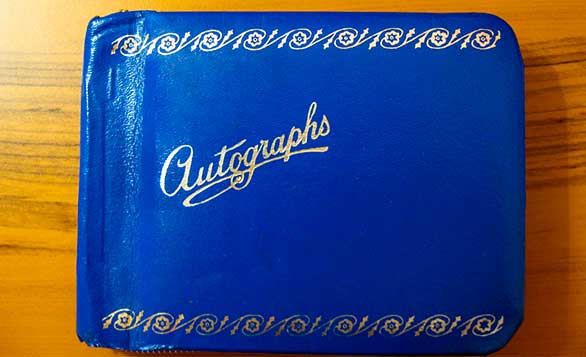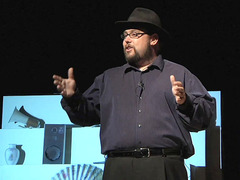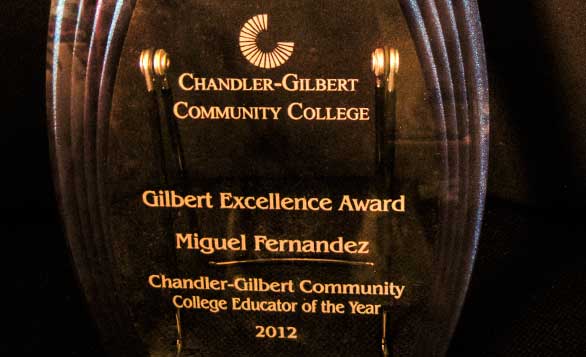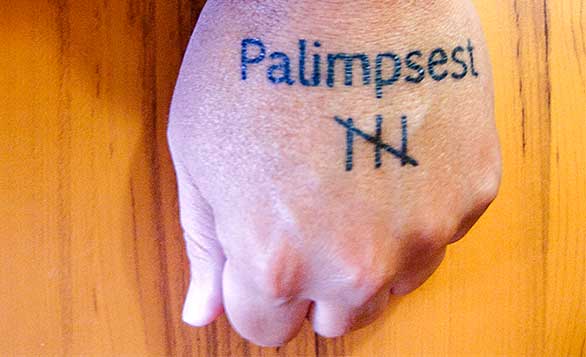
A vintage autograph book that provided a clue.
By Miguel Fernandez
We all have an origin story, a moment that forever changes our life for the better. Reflecting on those moments in later days, you well up with gratitude, and with a desire to commemorate, to reach out, to reconnect. The idea is as far as most people go, and a quick Facebook or Google search — at most an email — usually satisfies the longing.
 Drew Dudley: Everyday leadership
However, if you’ve seen Drew Dudley’s TED Talk “Everyday Leadership,” you know it’s your duty to mobilize. As he says, we should not “let people who have made our lives better walk around without knowing it.”
Drew Dudley: Everyday leadership
However, if you’ve seen Drew Dudley’s TED Talk “Everyday Leadership,” you know it’s your duty to mobilize. As he says, we should not “let people who have made our lives better walk around without knowing it.”
For me, the moment that altered my life path took place 31 years ago. And the person who made my life better was a WWII Veteran who came to Harlem to do his post-war service as an educator. Mr. Broderick was my 6th-grade teacher, who pounded in the message that educational curiosity could lead a person anywhere. I was a directionless kid from a bad neighborhood with nothing to read at home beyond TV Guide. I found my compass browsing the “borrow-me shelf” of old encyclopedias he kept in his classroom. Questions — not the answers — were the most important thing to Mr. Broderick. Inspired by his classes, and by his persona, I spent lunch hours loitering in his classroom listening to him evangelize on the value of reading. While all of my teachers had been great, Mr. Broderick stood apart because he never treated his students like at-risk populations to be salvaged. The power of ideas and the joy of learning: these were Mr. Broderick’s direct and indirect lessons.
Watching Drew Dudley’s talk, I knew I had to find Mr. Broderick. I rushed to the garage in search of a clue as to how to find him. It was 105 degrees — a typical July in Arizona — and the garage was easily 5-10 degrees above that. Trying hard not to find scorpions, I dug into the large banker’s box that held my keepsakes from elementary and high school. Halfway in, I found it: a blue autograph book from 6th grade. On the third page in was a note from the most influential teacher I ever had. It read: “To our top student for 1981-1982. Keep in touch and keep me posted. – B. Broderick”
The video had triggered the idea; this tangible object lit my motivation. More memories rushed back: serious lessons imparted with humor, the shock of high expectations from a high-status male in the classroom, the recess-hour respite — so sacred to teachers! — surrendered to teach any student willing to give up their playtime. At age 12, I took notice and, in a few months, I had been converted to learning as a way of life. Because of this man at this pivotal moment, I had become a true believer in myself and my potential to be anything.
After 6th grade, I said goodbye, went to junior high and never saw Mr. Broderick again. I never came back to talk to him about my growing personal library: how walking from Harlem, down New York City’s Westside, I would buy used books sold on tables outside Columbia University, and was reading — if not necessarily understanding — the Aeneid, Nietzsche and more. I didn’t come back to thank him when I graduated high school, or when I was accepted to New York University as a prestigious MLK Scholar.
I remembered Mr. Broderick after freshman year, but by then it was too late: he had retired and moved away from New York. And still, life pressed on. After college, I moved to Arizona, and tenured as a professor of Literature and Composition at Chandler-Gilbert Community College, where I reach out to students the same way Mr. Broderick reached out to me. Years passed by, fast. Even after being hit over the head about the importance of giving thanks and not letting meaningful people go unacknowledged at professional growth training, I didn’t try to find Mr. Broderick.

An award that will be passed on to Mr. Broderick.
In 2012, I felt sky high after winning the Chandler-Gilbert Community College Educator of the Year award. I took my plaque, placed it in my office and sat with wonder over my odyssey: from directionless kid to a leader serving students, many who were first generation to education and the power of reading, just like me. And still, I hadn’t thanked Mr. Broderick — the man who’d continually pointed me toward the library. I self-excused: how do you find someone, 30 years later, who has such a common last name? Plus, I knew he would be nearly 90 at this point. Would he even be alive?
Finally, after Drew Dudley’s talk and the autograph book, the echoes of the call to “seek and thank them” took hold. Mr. Broderick had been missing in action from my gratitude’s call to duty for too long.
A few deep rounds of internet searching and finally, a clue: someone had established an endowment to a man who seemed to be my old teacher. The webpage mentioned, half way down, his service at P.S. 161 – my elementary school! So I sent an email to the woman who established the endowment — Lizabeth Wilson, the Dean of Libraries at the University of Washington.
A few hours later, a response — you can always count on librarians to come to the rescue. The endowment was indeed in honor of the same man. He was alive and well, retired, and living in Chicago. When Mrs. Wilson contacted Mr. Broderick by phone — the man has never owned a computer or had an email address — and mentioned my name and quest to find him, he remembered me. A few further email exchanges and I had a phone number for my 6th-grade teacher.
More nervous than I had been in years, I made the call. Mr. Broderick and I talked for almost an hour. All the vitality, all the interest, all the value placed on learning were in place, strong as ever. Some interesting coincidences emerged: he was a WWII veteran who went to college on the G.I. Bill; I am faculty liaison for better serving our veteran students under G.I. Bill 2.0. He asked by name about others from my 6th-grade class, many of whom I still knew. I said I wanted to see him and let him know that I’d be near Chicago for a conference in September. We agreed to a time and a place to talk more.
On September 21st, I will fly out to Chicago and reunite with my 6th-grade teacher after 31 years. I will shake his hand with my tattooed hand and say, “Thank you.” I will buy him dinner and tell stories about growing up, from HUD housing in Harlem to eventually becoming a fellow teacher. I will remind him about his “borrow-me shelf.” I will thank him for the lunch hours and recess talks, which influenced 30 years of my choices as a man and citizen. Inspired by Drew Dudley’s TED Talk, I will also do a little more: I will leave Mr. Broderick my plaque for Educator of the Year, and explain to him, likely through tears, “This is yours to keep” – an earned dividend on the investment he made in me years ago.
Hopefully, near the end of our reunion he’ll ask about the word tattooed across my hand. I can’t wait to tell him. It reads “Palimpsest.” It refers to the dark ages (like my old neighborhood), when writing materials were scarce, so writing surfaces were written upon several times — until text from the past intruded in the present, creating a remix of layers from different times. To me, this tattoo is about life as the process of revisions from contact with disparate ideas, experiences, characters and actions — past and present all mixing in unexpected ways. No better way to summarize myself then and now, or to describe my journey and Mr. Broderick’s impact on it, than with this word marked on my body forever.

A meaningful tattoo.
Comments (6)
Pingback: American Steroids Online
Pingback: So how can you do your own search for a significant teacher or instructor? | Miguel Fernandez' Palimpsest
Pingback: Drew Dudley and “lollipop moments” | Excellent Journey